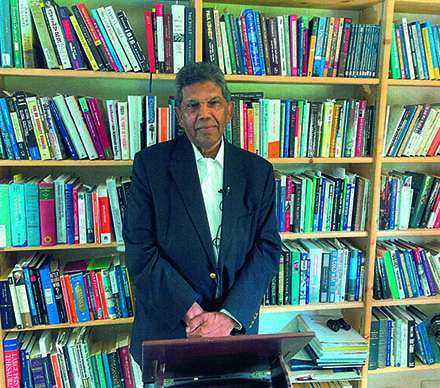By Dr. Bertrand Ramcharan
Barrister-at-Law (Lincoln’s Inn); Attorney-at-Law, Guyana.
Seventh Chancellor of the University of Guyana
At the heart of the UN’s Agenda 2030 lies Sustainable Development Goal 16, which aims for a ‘just, equitable, tolerant, open and socially inclusive world in which the needs of the most vulnerable are met’. How can Judges and Lawyers contribute to the realisation of SDG 16? In this essay we discuss a framework.
Judges and lawyers should have in view the importance of an adequate and effective National Human Rights Protection System in their country.
Every country should have in place an adequate and effective national human rights protection system. A national protection system has the following key dimensions: constitutional, legislative, judicial, institutional, educational, and preventive. Three issues require particular attention and scrutiny from the perspectives of international human rights law: first the adequacy of its fundamental human rights guarantees; second, the independence and efficiency of its judicial institutions; and third, the effectiveness of its national institutions for the protection of human rights.
A national protection system should provide for adequate and effective remedies to prevent violations of human rights, and to provide redress in cases of breach. In the event of a violation of human rights, the national protection system must provide for measures, beyond a victim-specific remedy, to be taken to avoid recurrence of the type of violation in question. Such measures may require changes in the State’s laws or practices.
Judges and Lawyers Should Have in View the Legal Obligations of Governments Under the UN Charter and the International Bill of Rights
The purposes of the United Nations are, among others, to achieve international cooperation in solving international problems of an economic, social cultural or humanitarian character and in promoting and encouraging respect for human rights and for fundamental freedoms for all without distinction as to race, language, sex, or religion, as well as to be a centre for harmonizing the action of nations in the attainment of these common ends. Article 55 of the Charter gives the United Nations a mandate to promote universal respect for and observance of human rights and fundamental freedoms for all. In Article 56, all Members of the UN pledged themselves to take joint and separate action in cooperation with the Organization for the achievement of the purposes set forth in Article 55.
Member States of the United Nations have three fundamental legal duties under the Charter:
First to have in place, in their own countries, an adequate and effective national human rights protection system;
Second, a duty to cooperate with the United Nations in its actions for the promotion and protection of human rights world-wide; and
Third, a legal duty to comply with: treaties they have voluntarily ratified or adhered to, universally-binding human rights norms of customary international law, norms of jus cogens, and norms that may be derived from general principles shared by the principal legal systems of the world.
Judges and Lawyers Should Have in View the Supremacy of International Human Rights Law Over Local Law
The principle of the supremacy of international law over national or local law has been repeatedly affirmed by the UN International Law Commission (on which we wrote our Doctoral thesis) and the International Court of Justice. The States of the world form a community governed by international law. Every State has the duty to carry out in good faith its obligations arising from treaties and other sources of international law, and it may not invoke provisions in its constitution or its laws as an excuse for failure to perform this duty.
Judges and Lawyers Should Have in View Mandatory Decisions of the United Nations Security Council
Under Article 24, paragraph 1 of the United Nations Charter, Members of the United Nations confer on the Security Council primary responsibility for the maintenance of international peace and security and agree that in carrying out its duties under this responsibility the Security Council acts on their behalf. Mandatory decisions of the Security Council, such as anti-terrorism measures, are legally binding within the legal order of every UN Member State.
Judges and Lawyers Should Have in View the Legal Obligations Undertaken by Their Government Under International Treaties
A State Party to a human rights treaty must respect and ensure the rights in the treaty to anyone within its power or effective control. The obligations in the treaty are binding on every State Party as a whole. All branches of government (executive, legislative and judicial), and other public or governmental authorities, at whatever level – national, regional or local – have a duty to comply with the provisions of the treaty.
States Parties must adopt legislative, judicial, administrative, educative and other appropriate measures in order to fulfil their legal obligations.
Judges and Lawyers Should Have in View the UN Basic Principles and Guidelines on the Right to a Remedy and Reparation for Victims of Gross Violations of International Human Rights Law and Serious Violations of International Humanitarian Law
The UN Basic Principles and Guidelines on the issue of remedies and compensation, which the UN General Assembly adopted in 2006, are an authoritative statement of the duty of Governments to provide remedies for human rights violations. The adoption of the Basic Principles and Guidelines followed years of study by independent experts, with due regard for governmental comments. The document is a magisterial summary of the contemporary international law of human rights generally, and of the ideas of justice, redress and reparation in particular.
Judges and lawyers should abide by the UN Basic Principles on the Independence of the Judiciary
The UN Basic Principles on the Independence of the Judiciary (1985) contain important guiding statements for all judges and lawyers. It provides that the independence of the judiciary shall be guaranteed by the State and enshrined in the Constitution or the law of the country. It is the duty of all governmental and other institutions to respect and observe the independence of the judiciary.
There must not be any inappropriate or unwarranted interference with the judicial process, nor shall judicial decisions by the courts be subject to revision. This principle is without prejudice to judicial review or to mitigation or commutation by competent authorities of sentences imposed by the judiciary, in accordance with the law.
The principle of the independence of the judiciary entitles and requires the judiciary to ensure that judicial proceedings are conducted fairly and that the rights of the parties are respected. In accordance with the Universal Declaration of Human Rights, members of the judiciary are, like other citizens, entitled to freedom of expression, belief, association and assembly; provided, however, that in exercising such rights, judges shall always conduct themselves in such a manner as to preserve the dignity of their office and the impartiality and independence of the judiciary.
Judges and lawyers shall have in view universally-binding human rights norms
The World Conference on Human Rights, held in Vienna in 1993, famously declared that “The universal nature of these rights and freedoms is beyond question.” The UN’s Millennium Declaration resolved “… to respect fully and uphold the Universal Declaration of Human Rights; to strive for the full protection and promotion in all our countries of civil, political, economic, social and cultural rights for all.”
The universality of human rights must be vigorously upheld. It rests on the idea that there is a minimum body of basic human rights that belongs to every human being regardless of his or her country of origin or philosophical, religious, or other beliefs. Regional or national charters may add to the universal body of human rights but may not detract from them.
Judges and lawyers should have in view governmental obligations to ‘Pre-vent’, ‘Respect’, ‘Protect’, ‘Ensure’, ‘Fulfil’, and ‘Guarantee’ Human Rights
Universally-binding human rights norms may require Governments to prevent violations of human rights, to protect human rights, to respect human rights, to fulfil human rights, or to ensure human rights. Each of these terms has legal content. In the Velasquez Rodriguez Case (1988), the Inter-American Court of Human Rights held that any exercise of public power that violates human rights is illegal. Whenever a State organ, official or public entity violates one of these rights, this constitutes a failure of the duty to respect the guaranteed rights and freedoms.
The State, the Court continued, has the legal duty to take reasonable steps to prevent human rights violations and to use the means at its disposal to carry out a serious investigation of violations committed within its jurisdiction, to identify those responsible, to impose the appropriate punishment and to ensure the victim adequate compensation.
Judges and lawyers should have in view the concepts of Human Dignity, Equality, Justice, and Survival Rights
Respect for, and protection of, human dignity is an animating and guiding principle of the whole human rights project announced by the UN Charter and the Universal Declaration of Human Rights. The concept of human dignity signifies worth or estimation. The UN Charter makes several references to the principles of the dignity and equality of all human beings. In the Preamble of the Charter, the Peoples of the United Nations reaffirmed their faith in fundamental rights, in the dignity and worth of the human person and in the equal rights of men and women.
In a world of deprivation, climate change and environmental degradation, Judges and Lawyers should be mindful of the relevance of survival rights.
A Judicial and Legal Pledge for Human Rights
Every Judge and Lawyer should reflect on the following personal pledge: “I shall always have in view the need for an adequate and effective national human rights protection system in my country and how it might be enhanced. I shall be mindful of the legal obligations of the Government under the United Nations Charter, under international and regional human rights treaties, and under rules of international customary law, especially norms of international public policy (jus cogens).
I shall take inspiration from the historic mission and philosophy of the International Bill of Rights, which consists of the Universal Declaration of Human Rights, the International Covenant on Economic, Social and Cultural Rights and its Optional Protocol, and the International Covenant on Civil and Political Rights and its Optional Protocols. I shall strive to play my part and to contribute to the promotion and protection of human rights in my country and across the world.”






